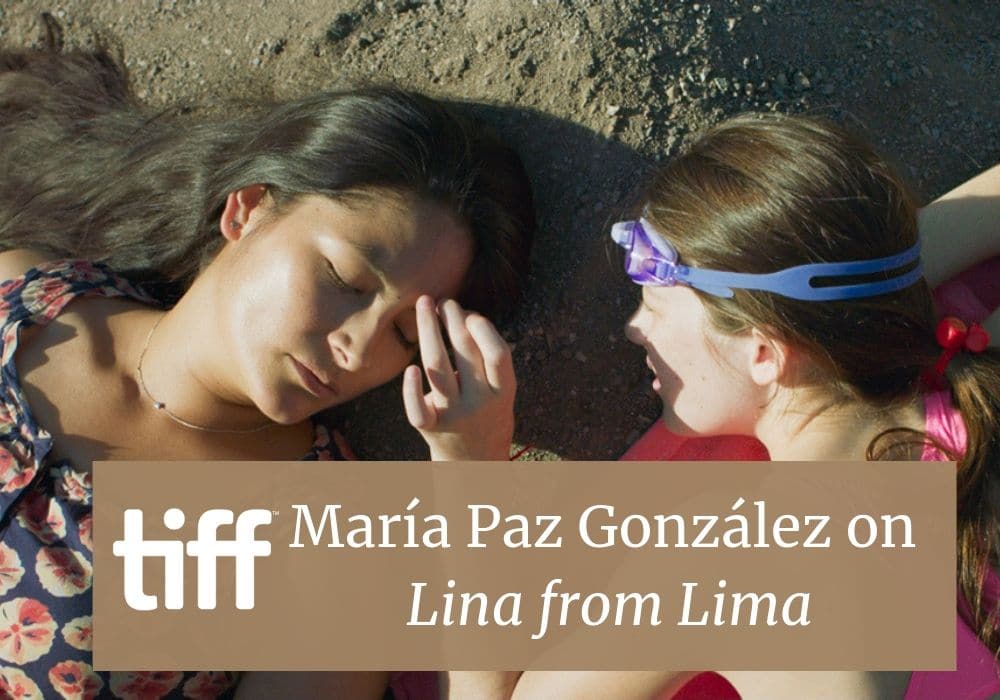Lina from Lima is one of the best acquisition titles at TIFF19. Director María Paz González talks making the film part realist drama about the immigrant working experience and part flamboyant musical.

Lina from Lima may contain several musical numbers, but director María Paz González insists it’s “not a real musical.” That’s not because the musical numbers are lacking: they’re colourful, bombastic, creatively staged, and well performed by star Magaly Solier. However, the musical sequences are starkly separate from the film’s actual narrative. They’re the daydreams of Lina, a Peruvian immigrant working as a housekeeper in Chile. Lina’s escape from life’s boredom and disappointments is to imagine herself as a musical star, singing melodramatic songs that are a world away from the rest of the film’s stark realism.
At TIFF, I spoke to Paz González at about why she chose to tell Lina’s story with the help of the musical form. She was accompanied by producer Giancarlo Nasi, who aided with some translation.
Seventh Row (7R): What was the genesis of the project?
María Paz González: I began this project researching the powerful and colourful immigrant world in Chile. At the beginning, I wanted to make a documentary. I really wanted to tell an intimate story about a woman who lives far away from home. At one point, the film became fiction.
7R: At what point did the musical element come in?
María Paz González: For me, it was from the beginning, but maybe the producer will say that it wasn’t until nearer the end.
Giancarlo Nasi: She lied to me for many months, for years!
María Paz González: [laughs] In the screenplay, it said “Musical” but nothing else, so it was a mystery. It was kind of a secret. But to me, it was the most important part of the film. It’s the heart.
7R: From the beginning of the film, before there are any songs, the sound design feels very musical. It felt like you were bringing out the rhythms of everyday life.
María Paz González: I was trying to find a way into this intimate world. [Lina is] a character who is around a lot of objects. There is a sofa. There are plastic bags… there are a lot of things around her. For me, there was a very interesting relationship between musicals that are super bold and this normal world that’s very detailed. We worked with an Argentinian sound designer called Sofía Straface. She makes very careful work of trying to find the little details of the film.
7R: What musical films inspired you?
María Paz González: The films of Tsai Ming-liang were completely an inspiration: The Hole, The Wayward Cloud… These films have musical episodes, so in the middle of the reality, you can find these episodes. Lina from Lima is not a real musical, because other musicals are talking about reality through the music, but here, we are not.
It wasn’t just films. Peruvian music was a big inspiration. People often see immigrants as an ‘other’, as if they are not like us. I would like to change that point of view and see the story from the inside. That is why I tried to reconstruct this powerful and colourful place, because I know that they are like that.
7R: What was the process of writing the actual music?
María Paz González: The music was quite complex. We worked in a big team: me, Magaly, and the composers Cali Flores and José Manuel Gatica, who’s also my partner. I would make some of the lyrics, Magaly would make some more, and then the composers wrote music. We shot with very rough tracks, but then in the post-production, we worked with some amazing musicians and [sound technicians] to bring out the power of the music.
7R: How did you cast Magaly, and how did the two of you work to develop the character of Lina?
María Paz González: I didn’t really want to make a “casting”. I needed to find a person who had a strong personality. I came from documentary so I know how to work with people who have this power already inside, not reconstructed technically.
So I wasn’t sure about Magaly at the beginning because, to me, she was so beautiful, so power, and I was a bit scared about that. I didn’t really want to make an exotic or too glamorous character.
But then, when I met her, I discovered that she was amazing. She has a very strong relationship with the character’s life. She is a worker. She works far away from home. She calls her mother all the time to talk about money. That was part of her life.
7R: When you cast her, how did the character change from what was in the script?
María Paz González: It changed a lot. I think it’s the same character at heart, but it grew. Magaly’s gaze was so powerful, she had such a powerful look, that in the editing process, we erased a lot of the text, and we just left space for her face on the screen.
7R: How much were the actors allowed to improvise?
María Paz González: At the beginning, it was a very fictional film without much improvising. But I worked with another actress who plays the cousin of Lina, who uses her real name in the film. She is a person who inspired the writing of Lina.
I used a lot of real experiences. For example, the pool worker is a real pool worker, and he always has affairs with the women in the houses. When he talks about different kinds of women in the film, those are his real words.
7R: What are you working on next?
María Paz González: I’m making a kind of thriller with some absurdity and comedy. It’s around the figure of a father, and it’s a film that happens in the south of Chile. It takes inspiration from thrillers and also from real life. The main character is an actress who works in a hospital…
Giancarlo Nasi: She is an actress and her job is to act as if she is a sick patient in front of doctors just to help them practice how to deal with extreme patients. It’s an actual job.
Lina from Lima screens 9/14 at 12:30 p.m. (Scotiabank). Tickets here.

